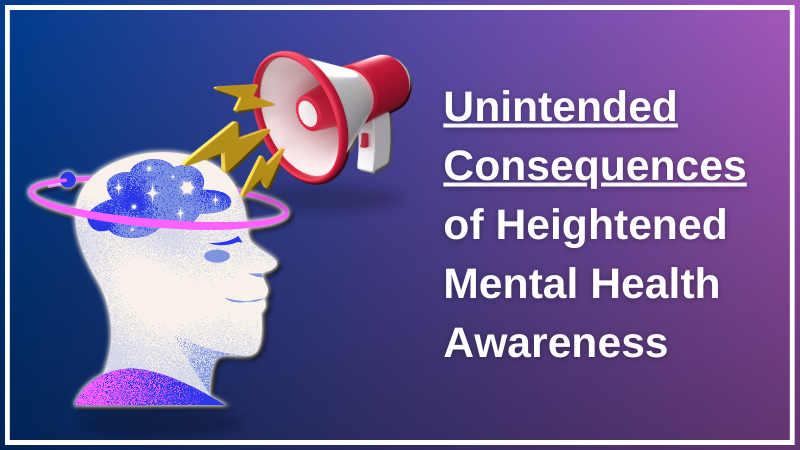Unintended Effects of Mental Health Awareness
In recent years, there has been a marked increase in awareness around mental health, leading to essential dialogues and encouraging individuals to be more open about their emotional wellbeing.
While this shift towards openness is undoubtedly a step in the right direction, breaking down age-old stigmas and fostering empathy, it's crucial to assess its benefits and possible downsides critically.
In this blog, we look at this nuanced topic and explore potential challenges that could emerge from heightened awareness around mental health.
Recent Research
Recent papers by Dr Lucy Foulkes, a research fellow at the University of Oxford, delve into the possibility that well-intentioned efforts to improve mental health outcomes, such as awareness-raising campaigns, might unintentionally exacerbate these problems in some individuals.
While such research is generally in its infancy, it underscores the awareness among academics regarding the potential issue. As an illustration, a recent journal paper Foulkes co-authored remarked that there is a growing tendency to medicalise mild distress in young individuals, potentially leading to the undervaluation and disempowerment of the significance of social support.
Self-Diagnosis
One potential consequence of heightened mental health awareness is the surge in self-diagnosis. While recognising symptoms and seeking help can be helpful, and some self-diagnoses are valid, they can sometimes be problematic.
Online platforms and readily available information have empowered individuals to research their symptoms and draw conclusions about their mental health. While this can lead to productive self-awareness, it can also result in misinterpretations and unnecessary worry. Attempting to simplify self-diagnosis into a strictly positive or negative phenomenon is overly reductionist, but maintaining an awareness of its potential drawbacks is critical.
The Blurring of Mental Health and Mental Illness
Another issue is the tendency to use the terms "mental health" and "mental illness" interchangeably. Mental health encompasses a broad spectrum, ranging from optimal wellbeing to mental health challenges or conditions.
It's crucial to distinguish between the two to ensure people understand what constitutes normal fluctuations in thoughts and mood and what could suggest a mental health problem in need of further support.
Gain insights into the differences between mental health and mental illness in under 90 seconds with Dr Tony Mawson here.
Social Media
Social media has significantly spread mental health awareness, enabling individuals to share their experiences and support one another.
However, a growing trend of mental health hashtags and posts may inadvertently romanticise some mental health struggles. While most online posts may come from a place of authenticity and vulnerability, they may also be triggering for others and potentially sometimes idealise mental health issues.
False Support
In recent years, businesses have increasingly embraced mental health initiatives within the workplace, introducing programmes like employee assistance schemes and designated mental health days. These endeavours are commendable, offering employees much-needed support and destigmatising mental health conversations.
However, there is a risk of performative support, where businesses merely pay lip service to mental health concerns without substantial action, undermining the sincerity of their efforts.
Balancing Awareness & Responsibility
The critical question is: How can we balance promoting mental health awareness and ensuring responsible conversations around mental health?
1) Accurate education: Encourage accurate and responsible discussions about mental health and ensure everyone knows they have the potential to recover from poor mental health with the proper support and resources.
2) Language matters: Be mindful of the language we use. Distinguish between mental health and mental illness, and have nuanced conversations that reflect the true complexity of these issues.
3) Professional guidance: Encourage individuals to consult qualified mental health professionals for advice and support.
4) Responsible sharing: While sharing personal experiences can be powerful, consider the impact of your content on others. Be aware of potentially triggering material and exercise sensitivity.
Final Thoughts
Of course, none of this blog intends to suggest that awareness is a negative thing. It's a force for good when approached correctly.
The rise of mental health awareness is undoubtedly a positive influence that can lead to meaningful change. However, navigating this newfound openness with care and responsibility is essential. Approaching this matter thoughtfully and sensibly is vital to ensuring that the advantages of mental health awareness prevail over potential drawbacks. How society has these dialogues will ultimately determine whether the benefits outweigh the potential downsides.
We'd be interested to hear your thoughts on this matter at info@mentehealth.com.
What We Do
We assist companies in addressing workplace mental wellbeing via our digital platform and advisory services.























